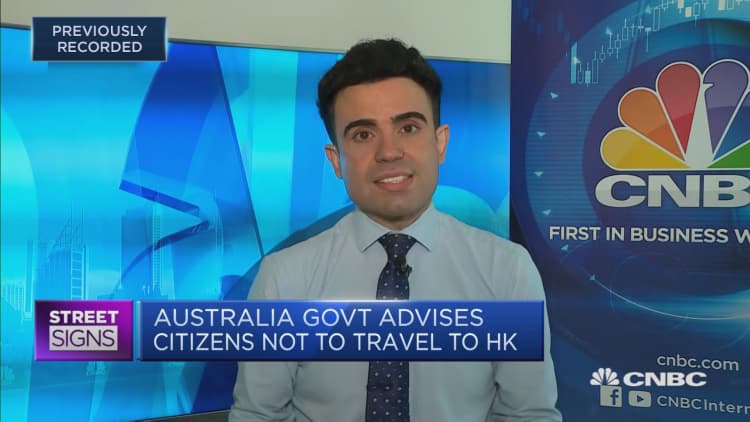
The Australian government has advised its citizens not to travel to Hong Kong, and to reconsider their need to remain in Hong Kong, due to uncertainties surrounding the new national security law there.
"The new national security legislation for Hong Kong could be interpreted broadly. Under the law, you could be deported or face possible transfer to mainland China for prosecution under mainland law," according to a notice on Thursday by the Australian Department of Foreign Affairs and Trade's Smartraveller website.
It added that the full extent of the law and how it will be applied is not yet clear and that Australians could be "at increased risk of detention on vaguely defined national security grounds. You could break the law without intending to."
Hong Kong is a special administrative region of China. The new law took effect last Tuesday, after the top decision-making body in the Chinese parliament voted to approve it.
The city has experienced months of pro-democracy demonstrations that sometimes turned violent. Beijing says the Hong Kong national security law is aimed at prohibiting secession, subversion of state power, terrorism activities and foreign interference.
Opponents of the law, including British Foreign Minister Dominic Raab, say it undermines Hong Kong's autonomy that was promised when the special administrative region was handed over to China in 1997.
Under the "one country, two systems" policy, the territory has a largely separate legal and economic system from the mainland that reflects its British colonial heritage. That framework — known as the Basic Law of the Hong Kong Special Administrative Region of the People's Republic of China — is supposed to be in place until 2047.
Since March, Australians have been banned from traveling overseas — unless they obtain an exemption, due to the coronavirus pandemic.
Suspension of extradition agreement
Also on Thursday, Canberra announced that it was suspending Australia's extradition agreement with Hong Kong.
The decision was made as the city's new national security security law represented a "fundamental change of circumstances with respect to our extradition agreement with Hong Kong," said Australia Prime Minister Scott Morrison, according to a recording.
The Chinese embassy said Australia's new measures were a "gross interference in China's internal affairs."
In a statement, the embassy in Australia said: "China strongly deplores and opposes the groundless accusations and measures announced by the Australian government with regard to Hong Kong." It also said they were "a serious violation of international law and basic norms governing international relations," and maintained that the new law will not affect the rights and interests of Hong Kong residents and foreign institutions there.
Canada last week also announced it would suspend its extradition treaty with Hong Kong due to concerns over the new national security law.
At the same press conference, Morrison announced measures to help Hong Kongers who want to make a fresh start in Australia. He said that there are some 10,000 people from Hong Kong who currently live in Australia, either on student or work visas.
Morrison announced that "for skilled and graduate visa-holders, we'll be extending visas by five years from today, with a pathway to permanent residency at the end of those five years."
The United Kingdom also offered Hong Kong citizens a path to citizenship last week, after the implementation of China's new security law.
— CNBC's Evelyn Cheng and Abigail Ng contributed to this report.

